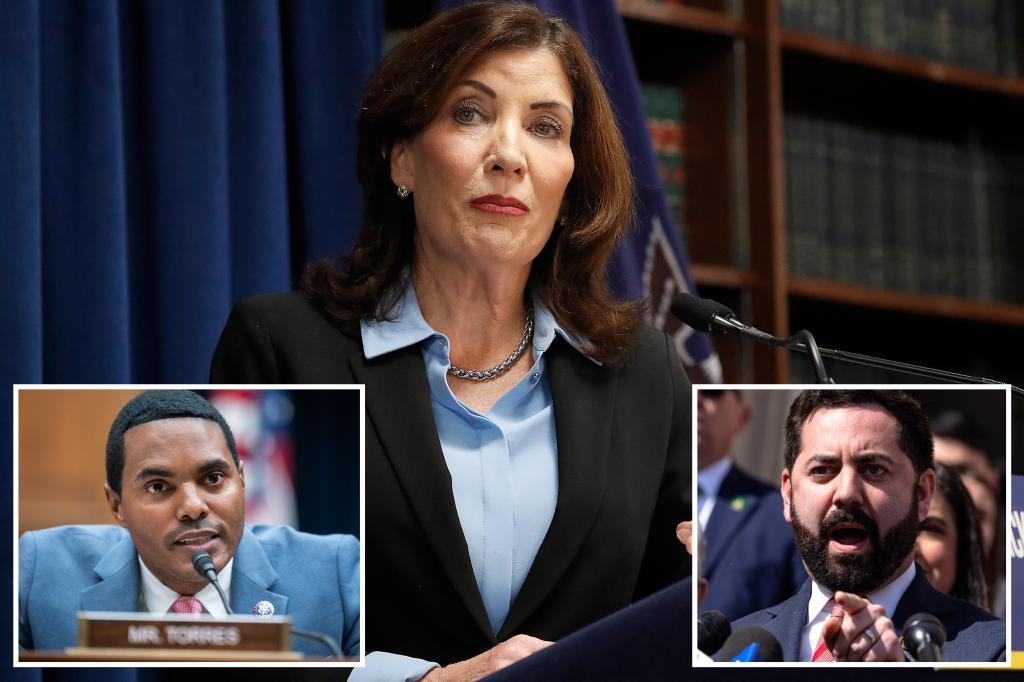New York Governor Kathy Hochul faces a daunting uphill battle as she looks toward potential re-election in 2026, with a new Siena College poll revealing deep voter dissatisfaction with her performance and a clear preference for alternative leadership. A mere 33% of respondents indicated they would vote for Hochul if she chooses to run again, starkly contrasting with the 57% who expressed a desire for a different candidate. This discontent spans across party lines, indicating widespread dissatisfaction rather than purely partisan opposition. Hochul’s favorability ratings remain submerged in negative territory, with a 39% approval rating dwarfed by a 49% disapproval rating. This negative trend has persisted for months, raising serious concerns about her ability to rebound and regain public trust.
The poll underscores a distinct lack of enthusiasm for a second Hochul term, even amongst her own Democratic base. Less than half of Democratic voters, 49%, support her re-election bid, while a significant 32% believe it’s time for a new face at the helm of state government. This internal division within her own party presents a major challenge to Hochul’s ability to consolidate support and mobilize a winning coalition in the future. The governor’s net favorability rating, while slightly improved from previous months, remains a concerning -10%, highlighting the persistent negative perception she faces among New York voters. This lingering negativity underscores the depth of the challenge she faces in reshaping public opinion before the next election cycle.
Further fueling voter dissatisfaction is the highly controversial congestion pricing plan for Manhattan, a key policy initiative championed by Hochul. The plan, which imposes tolls on vehicles entering lower Manhattan, has been met with widespread resistance, garnering only 29% support among those surveyed, compared to a resounding 51% opposition. This disapproval transcends geographical and political boundaries, with opposition dominant among city dwellers, suburban residents, and members of both major parties. The unpopularity of this flagship policy adds another layer of complexity to Hochul’s already challenging political landscape. It presents a tangible example of a policy decision that has seemingly alienated a significant portion of the electorate.
Adding to the complex picture of New York politics, the Siena poll also gauged public opinion on former President Donald Trump’s immigration policies, specifically his pledges to deport undocumented immigrants. Surprisingly, a majority of respondents, 54%, expressed support for these deportation efforts, while only 35% indicated opposition. This finding further complicates the narrative of New York as a uniformly liberal stronghold and highlights the nuanced views on immigration within the state. The support for Trump’s policies, even among a plurality of Latino voters (47%), suggests a potential vulnerability for Democrats who may be perceived as too lenient on immigration enforcement.
The poll also offered a glimpse into the potential field of challengers who might contend with Hochul in 2026. Bronx Representative Ritchie Torres, a vocal critic of the governor, emerged with limited statewide name recognition, despite a relatively favorable rating among those who knew him. A significant 68% of respondents indicated unfamiliarity with Torres, suggesting he faces a substantial hurdle in building broader awareness across the state. While his favorability ratings are stronger within New York City, he would need to significantly expand his name recognition beyond the five boroughs to mount a serious gubernatorial challenge.
Similarly, other potential contenders, including Hudson Valley Representative Mike Lawler and Lieutenant Governor Antonio Delgado, suffer from low name recognition statewide. Lawler faces underwater favorability ratings, with higher unfavorable than favorable scores, further complicating his prospects. Delgado, despite efforts to raise his profile, remains largely unknown to the majority of voters. This lack of name recognition presents a significant challenge for any potential challenger hoping to unseat an incumbent governor, even one facing significant headwinds. The current landscape suggests a wide-open field for 2026, with no clear frontrunner emerging to capitalize on Hochul’s vulnerabilities.

